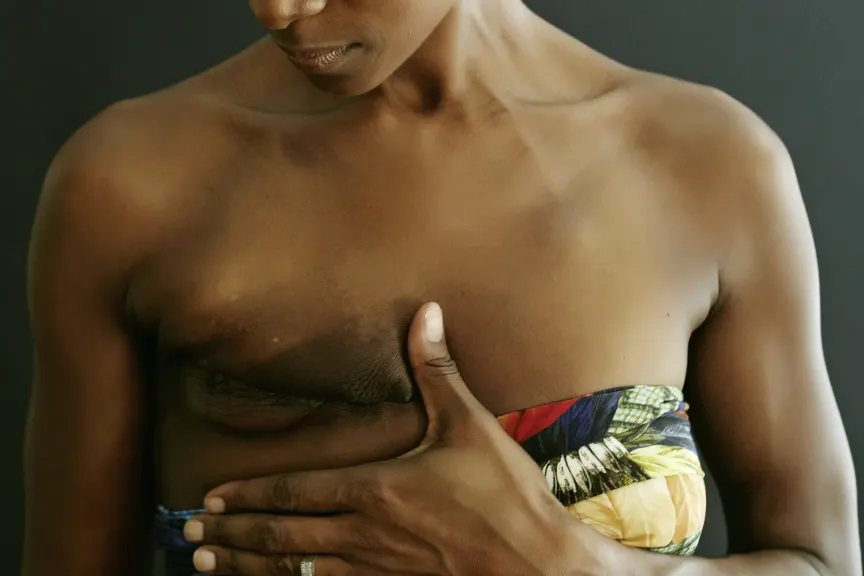How the Breast Cancer Community Is Taking on Photo Censorship
Though Instagram allows mastectomy photos, algorithms continue to flag them as “sexual activity.”

Earlier this month,something strange started happening to the Instagram account for The Breasties, a nationwide nonprofit breast cancer support group. The account admins noticed that mastectomy images they posted kept getting flagged and removed, labeled as “sexual activity” that violated Instagram’s community guidelines. Thinking it was a mistake, they ignored the problem at first—they had been sharing these kinds of photos for years to help empower women going through the surgery process.
Then on October 20, Instagram barredThe Breasties accountfrom hosting a livestream community education event for their followers. “That’s when we realized, ‘This is very unusual,’” says Brianna Majsiak, the organization’s co-founder. A notification warned that their account might be deleted due to the recent content they had shared.
Frustrated, the group decided to speak out. They posted about the recent censorship and called on Instagram to provide an explanation. “According to Instagram’s guidelines, they allow mastectomy photos, and they recognize the importance of that education and supporting those affected by cancer,” says Breasties co-founder Allie Brudner Brumel. But they soon realized that this problem was pervasive. The post received over 500 comments, many from breast cancer survivors and previvors who had also had their photos removed.
Why Images Matter
While it may seem like NBD to have one photo flagged or deleted, it's painful for those involved. “Social media has been such a powerful tool for our community to come together, share experiences,[and]share stories … to educate and empower one another,” Brumel says. Posting mastectomy photos allows women to normalize surgeries that are often shrouded in secrecy or shame. The Breasties is not the only survivors’ group affected by censorship—For the Breast of Us, a breast cancer community forwomen of color, also posted last week about having photos removed and their account flagged for deletion.
In a statement, Instagram communications spokesperson Liza Crenshaw notes that the platform is working to address issues with the algorithm, which is likely responsible for the mistaken censorship. "We have reinstated these images and apologize to breast cancer survivors and previvors for any unintentional hurt caused,” she says. “We've allowed people to post images of mastectomies for many years. This policy hasn't changed, and we are working to address why these images were removed in the first place.”
Still, it’s important that women be able to share these photos without fear of backlash—even backlash caused by a technological glitch. Melanie Penn, 33, of Staten Island, NY, had her Instagram stories temporarily deleted this month after sharing mastectomy photos from other women. Penn, who opted for preventive surgery in 2017 after learning that she carried the BRCA1 mutation, says that Instagram was life-changing for her as she prepared for her own procedure. “I connected with dozens of women my own age, who looked like me, sharing photos of their surgeries,” she remembers. “They shared the results, the hospital images with markings on them, their drains, their incisions, and all of their scars. I was so grateful to no longer feel alone.”
Brudner notes that for young women and especially women of color, there is a lack of accurate representation of what post-surgery bodies can look like. “A lot of the people in our community aregoing through surgeryor dealing with a cancer diagnosis or high-risk[diagnosis]at a very young age,” she says. “They don’t see other people going through what they’re about to go through or what they’re currently going through.” These posts also help women understand what questions to ask their doctors before surgery. “Sometimes you don’t know those questions to ask,” Brumel notes. “These photos and posts help you have a baseline to go in with, and to have that knowledge so you can empower yourself and ask the questions to get you the best care.”
Not Just Breast Cancer
这个审查问题超越了乳腺癌community—it affects chronic warriors as a whole. The Breasties received messages from survivors of other cancers, Brumel notes, as well as a woman whose photos of her ostomy bag were removed by Instagram. “Clearly, this is bigger than just us—it’s bigger than The Breasties, and it’s bigger than just breast cancer,” she says. “It seems like, from the messages and comments we’ve received, it’s happening to all people who don’t fit that standard mold of what society expects you to look like.”
Even though technology (and not policy) is at fault for this, it’s still painful to have your post-surgery body flagged for censorship. “There’s a lot of bravery that goes behind taking that step to share the story,” Brumel says. “A lot of women have expressed feeling such shame or defeat after[being censored].”
Not only that, but the removal of these photos does a disservice to the women who could benefit from seeing them. “This censorship is preventing the spread of valuable information between members of this community,” Penn says. “It is furthering the stigma and the shame that have, for years, surrounded these diagnoses and surgeries.” Ultimately, she received a message from an Instagram team member that her account has been fully reinstated. Still, while it was censored, she was unable to host a live education event as planned.
Over the past week, The Breasties have been in conversation with teams at Facebook (which owns Instagram) to continue to address this issue. Especially during a year like 2020, it’s critical that the chronic community be able to connect online and share stories. “People feel more alone than ever, especially navigating a new diagnosis or treatment,” Majsiak says. “We’re trying to get the message out there to please keep sharing … and we’re going to do everything we can to figure out what went wrong and how to stop that from happening.” If your account is affected, please keep posting and don’t give up. Your experience and your voice matters.
The Breasties:The Breasties. (n.d.) “About Us.”thebreasties.org/team
For the Breast of Us:For The Breast Of Us. (n.d.) “Our Mission.”breastofus.com/our-mission/
Instagram Community Guidelines:Facebook的帮助。(无日期)。“Instagram允许post-mastectomy photos?”facebook.com/help/instagram/678272128855443





